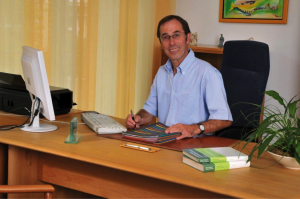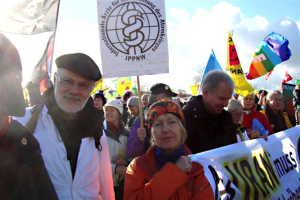Divestment of fossil fuels additionally discussed at the recent German Medical Assembly in May
At the beginning of April, 97 members of the Berliner Ärzteversorgung sent a letter calling on their pension fund to divest all of their fossil fuel shares within the next five years and to reinvest the freed capital in shares that support a sustainable and healthy future. The Berliner Ärzteversorgung holds assets worth 7-8 billion Euro.
The letter was initiated by Eckhard Schreiber-Weber, board member of MEZIS and myself, a member of the IPPNW– International Physicians for the Prevention of Nuclear War.
In our letter we referred to the health impacts of burning fossil fuels. The combustion of fossil fuels, particularly of coal, already causes pollution that leads to the premature death of millions of people every year. According to the Lancet Commission climate change poses the biggest threat to human health in the 21st century.
We argue that if the increase in temperature is to remain within the international community’s agreed 2° target, we must keep 60-80 % of the existing fossil fuel reserves in the ground. According to members of the financial community, the Bank of England and the World Bank, climate change carries a big financial risk and, therefore, also affects medical pension funds.
In our letter, we addressed the economic and moral responsibility, particularly that of doctors and medical organisations, to not continue investing in an industry, which is harmful to health and contributes to climate change – a threat to our entire civilisation. Sustainable investment has to pay off in the long-term, not only economically, but also ecologically. And the investment decisions of the pension fund should take into account public welfare and the living conditions of younger and future generations.
Meanwhile, during their recent general conference in May, the German Medical Assembly also dealt with the issue of divestment and has relegated a proposal for further discussion to the board. This proposal calls on all doctors and medical organisations, in particular pension funds, to divest from fossil fuel companies and to promote the debate on climate change and health within the medical profession and the general public.
In doing this, the proposal followed the decision of the British Medical Association, which in 2014 became the first association of physicians in the world to promote divestment. Generally, the debate within the British medical sector has been very helpful and a good example for us.
With our call and with the ongoing debate at the German Medical Assembly, the issue has been placed on the agenda of the German medical profession. Apparently, the investment strategy of the Berliner Versorgungswerk is already relatively sustainable and it no longer holds any shares in coal companies. So, the pension fund appears generally open to discussing our concerns.
The process of clarification within the committees of the medical pension fund requires some time. We, therefore, do not expect a quick decision. However, a positive outcome would surely act as a signal for other medical and other professional pension funds to also examine their divestment options. The climate and future generations will be more than grateful.
Let’s keep our fingers crossed,
Dieter Lehmkuhl


